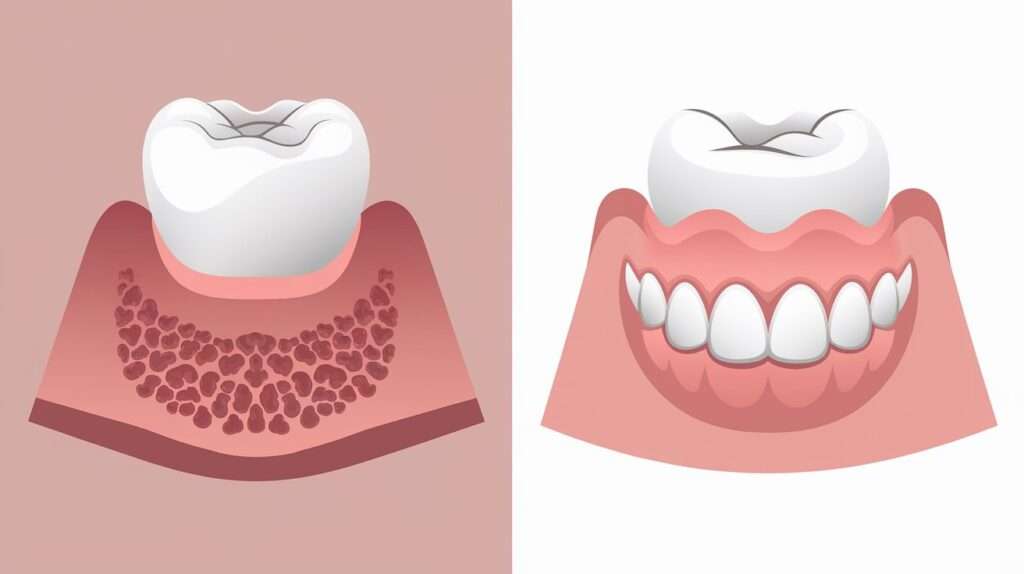Dental aesthetics have always been an integral part of our personal appearance and self-esteem. A bright, healthy smile not only boosts confidence but can also affect how we are perceived by others. When it comes to enhancing the appearance of your dental crown front tooth, two of the most common solutions are dental crowns and veneers. These treatments can transform discolored, damaged, or misaligned teeth, offering aesthetic and functional benefits. However, deciding between a dental crown for your front tooth or veneers can be tricky.
What are Dental Crowns and Veneers?
Dental Crown for Front Tooth
A dental crown is a custom-made cap that fits over a damaged or decayed tooth. It encases the entire tooth above the gum line, restoring its shape, size, strength, and appearance.
What Does a Dental Crown Do?
Restoration: Crowns are used to restore a tooth’s structure when it has suffered significant damage or decay.
Protection: Crowns protect a weak tooth from further breakage.
Aesthetic Enhancement: Crowns improve the appearance of a tooth, especially when it’s cracked, chipped, or discolored.
Veneers
A veneer is a thin, custom-made shell that covers only the front surface of the tooth. Veneers are primarily cosmetic and are used to enhance the appearance of the front teeth by improving their color, shape, size, or alignment.
What Do Veneers Do?
Cosmetic Improvement: Veneers are best for fixing small chips, minor misalignments, or discoloration.
Less Invasive: Veneers require less tooth reshaping than crowns since only a small portion of the front enamel is removed.
Which One Should You Choose: A Dental Crown Front Tooth or Veneers?
When it comes to deciding between a dental crown for a front tooth or veneers, the right choice depends on several factors such as the condition of your tooth, your aesthetic goals, and the functionality you need.
Which is More Durable?
If durability is your primary concern, dental crowns are generally more robust than veneers. Crowns cover the entire tooth, offering structural support, and are ideal for teeth that are severely damaged or weakened.
Veneers
While veneers are durable and resistant to staining, they are not as strong as crowns and may not be suitable for people who grind their teeth or have large fillings.
Crowns
Crowns provide complete coverage and protection, making them ideal for teeth that are exposed to high pressure, such as those used for biting or chewing.
Which is Better for Aesthetics?
Both dental crowns and veneers offer excellent aesthetic results, but veneers are often preferred when the main concern is cosmetic enhancement.
Veneers
Veneers excel at improving the appearance of teeth with minimal alteration to the natural structure. They offer a more natural and translucent finish, closely mimicking real teeth.
Crowns
Crowns can also be aesthetically pleasing, but they are more suitable when significant tooth reconstruction is needed.
Which is Less Invasive?
Veneers are generally considered less invasive than crowns because they require only minor reshaping of the tooth’s enamel. In contrast, crowns require more extensive reshaping and preparation of the tooth.
Veneers
A veneer requires only a thin layer of enamel to be removed, preserving more of the natural tooth structure.
Crowns
In the case of a crown, a substantial portion of the tooth needs to be shaved down to accommodate the restoration.
Who is the Ideal Candidate for Dental Crowns or Veneers?
Not everyone is an ideal candidate for either dental crowns or veneers. Here’s who should consider each treatment:
Who Should Get a Dental Crown for Their Front Tooth?
Patients with Significant Damage
If you have a front tooth that is significantly decayed, cracked, or broken, a dental crown may be necessary to restore both its function and appearance.
Post-Root Canal Patients
If you’ve had a root canal treatment on a front tooth, a crown is typically recommended to protect the remaining structure from breaking.
Severe Discoloration
Crowns are also a better choice if you have deep stains or discoloration that cannot be corrected with veneers or teeth whitening treatments.
Where Should You Get These Procedures Done?
For residents of Orlando, Florida, many reputable dental clinics are offering both dental crowns and veneers, as well as full arch dental implants for patients requiring more comprehensive solutions. Full arch dental implants can be a good solution.
Where to Find Quality Dental Care in Orlando?
Orlando has a growing number of dental practices specializing in cosmetic and restorative procedures. Clinics offering cutting-edge treatments with high-quality materials and technology are common in the region.
Why Choose One Over the Other?
The decision between a dental crown for your front tooth and veneers largely depends on the way your specific dental needs and goals.
Why Choose a Dental Crown?
To Restore Functionality
If your tooth is significantly damaged and needs structural reinforcement, a crown is a superior option. Crowns provide long-term durability and can handle the force exerted during chewing and biting.
To Protect Weakened Teeth
Crowns are a great solution if your front tooth has been weakened by decay or injury. They offer protection and prevent further damage.
Why Choose Veneers?
To Improve Aesthetics
Veneers are the go-to choice if your primary goal is to improve the appearance of your front teeth. They are ideal for correcting discoloration, chips, or minor alignment issues.
To Preserve Natural Tooth Structure
Veneers require minimal reshaping of your tooth, making them a conservative approach to cosmetic enhancement.
When is the Right Time for Dental Crowns or Veneers?
When Should You Get a Dental Crown for Your Front Tooth?
After Significant Tooth Damage
If your front tooth has suffered trauma, such as a crack or break, it’s time to consider a dental crown.
Following a Root Canal
When a root canal has been performed, the tooth becomes more fragile, making a crown necessary to protect it.
When Discoloration Can’t Be Fixed
If your tooth is severely discolored and can’t be treated with whitening or veneers, a crown may be the best option.
When Should You Consider Veneers?
For Minor Cosmetic Concerns
If you want to fix small chips, discolorations, or slight misalignments, veneers can provide a quick, effective solution.
When You Want a Minimally Invasive Procedure
If preserving as much of your natural tooth structure as possible is important to you, veneers are a great choice.
How Are Dental Crowns and Veneers Applied?
How is a Dental Crown Applied?
The process of getting a dental crown for a front tooth typically requires two visits to your dentist. Here’s how it works:
Tooth Preparation: The dentist will first remove a portion of the tooth’s enamel to make space for the crown.
Impression: An impression of your tooth is taken and sent to a dental lab, where your custom crown is created.
Temporary Crown: A temporary crown may be placed on your tooth while the permanent crown is being made.
Final Fitting: Once the permanent crown is ready, your dentist will fit it onto your tooth and make any necessary adjustments before securing it with dental cement.
How Are Veneers Applied?
The process of getting veneers is similar, though less invasive than crowns:
Enamel Removal: A thin layer of enamel is removed from the front of your tooth to make room for the veneer.
Impression: Your dentist will take an impression of your tooth and send it to a lab to create your custom veneer.
Temporary Veneers: Temporary veneers may be applied while you wait for the permanent ones.
Bonding: Once the veneer is ready, it is bonded to your tooth using a special adhesive.
Whose Smile Needs These Procedures?
Both dental crowns and veneers can transform a smile, but whose smile can benefit most from each treatment?
Dental Crowns: If you have a front tooth that’s significantly damaged or weakened, a dental crown can restore both function and aesthetics.
Veneers: If your front teeth are healthy but have minor aesthetic issues, veneers are an excellent choice to achieve a stunning smile.
Full Arch Dental Implants: A Comprehensive Alternative
While crowns and veneers are excellent for improving individual teeth, full arch dental implants offer a solution for patients in need of more extensive dental work. Full arch implants replace an entire row of missing teeth with permanent, natural-looking prosthetics.
What are Full Arch Dental Implants?
Full arch implants use 4-6 strategically placed implants to support a full set of prosthetic teeth. This treatment is ideal for patients who have lost most or all of their teeth due to decay, injury, or disease.
Who is a Candidate for Full Arch Implants?
Full arch implants are suited for patients who have lost an entire row of teeth or those seeking a permanent alternative to dentures.
Final Thoughts
In the ultimate showdown between dental crowns and veneers, the best choice comes down to your specific dental needs. Dental crowns provide durability and full coverage, making them ideal for damaged or weakened teeth.
For those in Orlando, Florida, there are many options for both crowns and veneers, as well as full arch dental implants if you need a more comprehensive solution.


